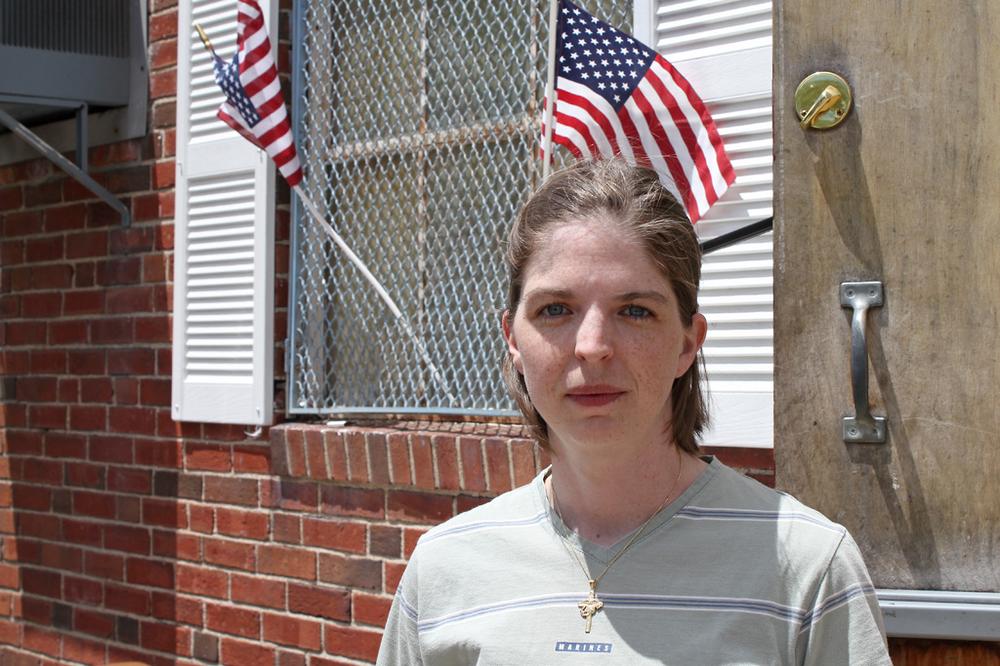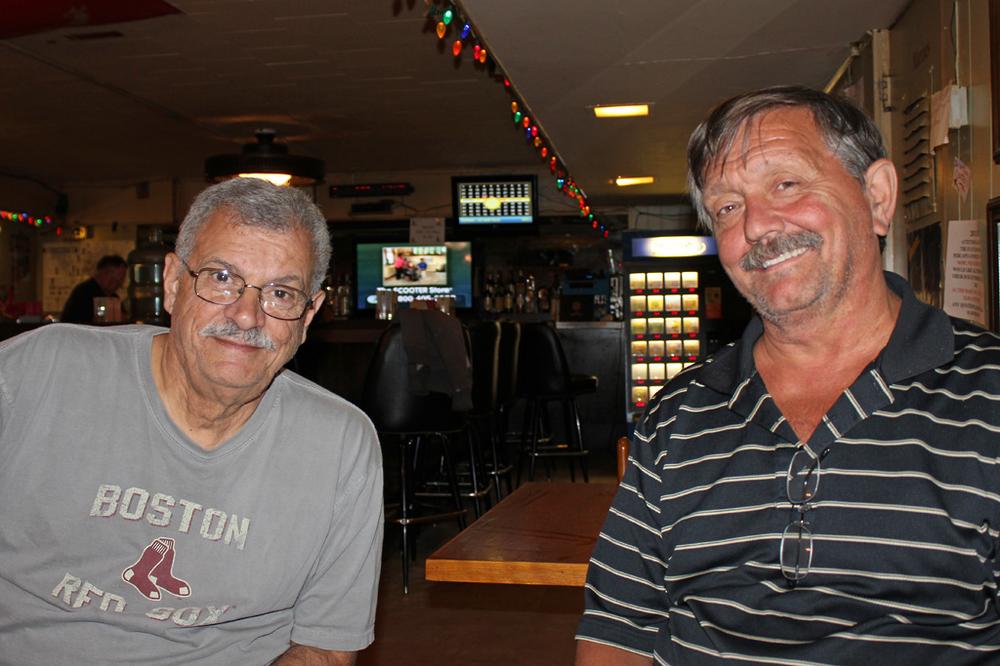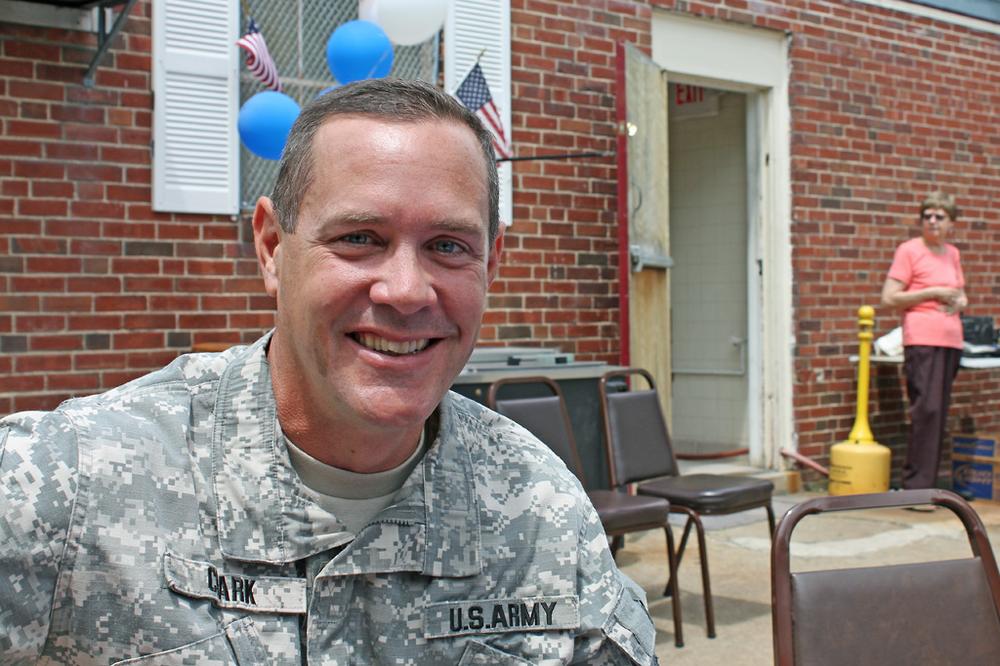Advertisement
Veterans Groups Struggle To Attract Young Soldiers
Resume
What comes to mind when you think of a VFW post or American Legion hall? Many of us imagine an old-fashioned basement bar, smelling of cigarettes and filled with aging men. With thousands of young people returning home to Massachusetts from Iraq and Afghanistan, we looked at these long-standing veterans groups and how they work — or don't — for the newest generation of soldiers.
CAMBRIDGE, Mass. — On the north bank of the Charles River, American Legion Marsh Post #442 served as an idyllic setting one recent summer afternoon for a cookout to honor the hundreds of Massachusetts reservists preparing to deploy for a one-year tour in Afghanistan.
With an American flag hoisted on a firetruck ladder nearby, dozens of parents, girlfriends, Boy Scouts and veterans gathered to enjoy some barbecue and music and salute the departing troops. Despite the festive tone, everyone knew the soldiers were heading to a dangerous place.
"The three provincial reconstruction teams are right along the Pakistani border, and it's a very serious mission for us," said Capt. Tom Clark, of the 181st Battalion Company C of Cambridge, sitting at one of the picnic tables scattered across the lawn. "We're there to provide security for these individuals so that the good works can continue for the Afghanistan people and their government."
With all that to get ready for, Clark can probably be forgiven for not showing up for too many events at the American Legion Post in New Bedford, where he's a member.

"It's really hard to be active preparing for a deployment, and then be so active in trying to fight the fight that the veterans groups are doing," admitted Clark, dressed handsomely in uniform and with a warm smile. "And so, it's one generation fighting for the next. When I become an older gentlemen, I'll be fighting for the soldiers that are serving when I'm 80 years old."
That's basically how these groups have always functioned — the older generations work for the next. But some people say that has got to change.
Ron Muti is one of those people. At 62, the commander of VFW Mount Auburn Post 8818 in Cambridge is one of the younger members of his post. Most of the guys fought in World War II or Korea, while Muti fought in Vietnam. Nationally, the average VFW member is 61 years old.
So Muti thinks it's important to show up for events like the cookout, or to greet groups of returning soldiers at the airport, to let them know they have a place in the VFW. With more than 100 posts closing across the country last year, Muti says the organization has to reach out to young veterans.
"The VFW is like a good ol' boy network. They've got to change their ways, otherwise they're going to be in a lot of trouble."
Ron Muti, commander, VFW Mount Auburn Post 8818
"It's almost a thing of the past, really, it's a dying breed right now," he said. "The VFW is like a good ol' boy network. They've got to change their ways, otherwise they're going to be in a lot of trouble."
But just down in the road, at the George Dilboy post in Somerville, Ron Patalano says Muti has it all wrong. "We ain't dying," he said. "If we're dead, nobody told me. I'm still alive."
Patalano is the former commander and serving quartermaster at George Dilboy. The post, with more than 600 members, is one of the state's largest. And here's the thing: it's growing. Patalano says 21 new members signed up last year, and about 90 percent of them were veterans of Iraq and Afghanistan. If a VFW post is dying, he says, its members aren't doing enough to reach out.
"We recruit," Patalano said. "When the units are going overseas and when they're coming home, we go there and we wear our hats. How can we help you? What can we do? Because the transition from active duty to where they go back into civilian life is a gap."

With the dark basement bar, jukebox and Christmas lights strung year round, the Somerville post doesn't look any different from other VFW halls. But, Patalano says, this post is much more than its bar. Young veterans are too busy with their families and jobs to be interested in a bar, he says, so the VFW attracts new members by offering them needed services and programs.
"We had a member who came back from Afghanistan and one of his friends died," Patalano explains. "We gave him the money to go out to the funeral. That's what we do."
But Patalano does admit to one shortcoming — one that Muti also acknowledges. Old or young, the VFW still isn't recruiting women.
Back in Cambridge, at the cookout, Liz Thompson is a rare exception. A Marine, Thompson joined an American Legion post in Watertown after returning from a nine-month stint in Ramadi, Iraq -- "it's still to this day been described as the worst place in the country at that timeframe," she said.
Coming back from an experience like that, Thompson says she turned to the American Legion because she needed a group of people who understood what she was going through. "We lost a lot of guys. It was difficult," she said. "Readjusting to being home, with family and friends, you've gone through a whole life-changing experience that they haven't been through."
But Thompson also understands why many of her peers — both women and men — aren't as eager as she was to join a VFW or American Legion post right away.
"I don't think people are ready fully to accept that they want to get involved and do something," she said. "It's kind of like, they served their contract and time's up and they don't want to have anything to do with the military anymore."
So it's up to the individual posts, and people like Ron Patalano and Ron Muti, to find these young veterans and let them know they can help — and that there's more to these posts than a basement bar.
This program aired on July 28, 2010.